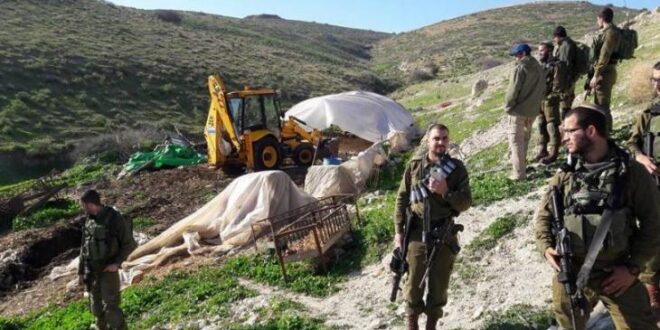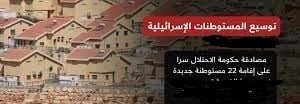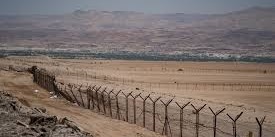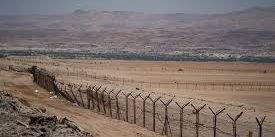Israeli authorities seize the largest area of land since Oslo
By: Madeeha Al-A’raj
The National Bureau for Defending the Land and Resisting Settlements stated in its latest weekly report , that in a precedent described as the largest of land confiscation in decades, the Israeli FM, and Minister of Settlement at the Ministry of Occupation Army, Smotrich recently declared the confiscation of 8,159 dunams in the Palestinian Valley, as the Occupation Authorities ‘OA’ handed a decision over to the Aqraba Municipality in the Nablus Governorate, approved by the abovementioned minister to seize the town’s land, and the Fara Valley, that were classified by OA as ‘natural reserves’.
The newly seized areas are in basins 13 and 14 at the ‘Jabal al-Qurain’, and basin 24131 of the Fara Valley, in blatant defiance of the resolutions of international legitimacy, international law, and international consensus that call on the Occupying State ‘OS’ to stop stealing Palestinian lands, and then turning them for settlement, noting that the seizure process of Palestinian land is the largest since the signing of the Oslo Accords between the Palestinian and Israeli sides.
Smotrich, who controls the Settlement Division at Civil Administration is not only convert majority of these areas into ‘natural reserves’ and closed military zones, but also prevents Palestinians’ livestock draw nearer the fence of the existing settlements there, as they used to before Oct. 7. His settlement plans and projects has become general features of the policy of the most extreme government in the history of the occupying state. We also mention here the confiscation of 2,640 dunums of citizens’ lands in the East Jerusalem wilderness at the end of last February, and about another 500 dunums by the end of 2023 from the lands of the Jaba village in the Jerusalem Governorate.
According to the plans of the occupation authorities, the Jordan Valley and the Jerusalem wilderness’ must be ‘clean’, that is, devoid of population, with the exception of the ‘Jericho enclave’, as specified in the agreements between the Palestinians and Israelis, such agreements, Israel deals selectively.
Excuses, such as, ‘natural reserves and military zones’ have become common in in the West Bank, especially in the Jordan Valley areas and in the areas south of Mount Hebron. They are effective means of imposing a siege on Palestinian communities to restrict their movement and push them towards leaving and emigrating, while settlers are exempted, and allowed to establish pastoral farms that are deliberately established close to Palestinian pastoral communities, and occupy large areas of land, either by fencing them or by preventing Palestinians from grazing there.
In addition, those in charge of the farms organize repeated attacks against Palestinian shepherds and their livestock, as they enter the middle of the herd. With tractors and dogs beat them, attack gatherings at night, stone them, steal sheep and cows, and destroy fodder and water tanks that are documented by Israeli civil society organizations that follow the settlers’ activities and oppose them.
The OA leaves no means to confiscate lands under the pretext of natural reserves and military sites, especially in the Palestinian Jordan Valley, the northern, central and southern Jordan Valley in a clear effort to displace the Palestinians from these areas, which the Deal of the Century allocated as a vital security area for the occupying state and settlement activities in the shape of pastoral farms, which have multiplied since then, such as the ‘Shirat Ha’sbim , Tinh Yarok, Maskiot, Eretz Hashemesh, Nof Gilad, and Goshen farms. Residents of these farms, who raise cows and sheep, are the ones who exert the main pressure on the Palestinian herding communities in the region.
In a look at the demographic situation of the Palestinian Jordan Valley throughout the years of occupation, confirms that the occupation authorities are practicing a clear policy of displacement and ethnic cleansing in this region. According to data from the Palestinian Central Bureau of Statistics for 2017, the number of Palestinians in the entire Jordan Valley, including Jericho, was 54,731 Palestinians. If we exclude the large gathering represented by Jericho, Aqabat Jabr, and Ein-Qattan, we found that the number of the people remained in the area extending from the Bisan checkpoint in the north to the Ein Gedi checkpoint in the south, about 12.000 Palestinians, living in Bedouin herding communities and gatherings.
Knowing that on the eve of the 1967 war, the area included about 350,000 refugees, who went down to the Jordan Valley in search of sources of livelihood and found that the existing springs there were capable of providing acceptable life requirements for them. In 1967, the occupying state destroyed 33 Palestinian villages in the Al-Ghor region, including ruins and small and medium-sized villages, especially the villages that lived on the river east of Route 90, where only a limited number of villages remain today, Ein Al-Bayda, Al-Auja, Al-Jiftlik, and others that are not recognized villages, not only that, but the OA reduced large areas of their pastures and prevented their regular supply of water As well as various life facilities in cooperation with the army, police, settlers of the region and the Jordan Valley Regional Council.
The Oct. 7’s events came to provide an appropriate opportunity for the OA and settlers to continue the displacement operations and tighten control over large areas of land in the Jordan Valley in light of the declaration of a state of war and the accompanying expansion of the use of the emergency law, and the assignment of the Home Front Command in the Israeli army to act in accordance with war’s requirements, besides decisions to confiscate large areas, such as those recently announced by Bezalel Smotrich, and the decisions of Itamar Ben Gvir to arm the settlers, who have become an armed army in the West Bank, noting that all of them are regular soldiers or reserve soldiers.
In a related context, Smotrich appears to be stuck between the sanctions that the American Administration and other Western countries have imposed on some settlers, who practice violence and terrorism against Palestinian citizens, and their settlement outposts, and the promises of protection that he lavishes on the settlers in general and his electoral base in particular. So, he is criticized for his failure to confront the American sanctions that were imposed on part of his voter base.
He not only he expands the theft of funds collected by the OA for the benefit of the Palestinian Authority, but also threatens not to renew the protection granted by the occupying state to ‘Discount and Hapoalim banks’ against lawsuits due to their financial connection to institutions in the Palestinian Authority. He also threatened the Israeli banks and called on them not to cooperate with the sanctions, but he soon discovered that those banks feared non-compliance with the sanctions more than they feared him. Smotrich spoke with the supervisor of banks, but found a clear resonance there, as was the case in the discussion that took place on this issue in the Knesset Economics Committee.
Smotrich is trying to put a finger in the eye of the American Administration to please his voter base, but the muscles he is trying to display seem like a desperate attempt to save his party, which is fluctuating above and below the electoral threshold, and may ultimately collapse, due to an economic tragedy that a large portion of his voters find themselves among.
On the other hand, issuance of this Weekly Report coincides with the 48 anniversary of Land Day. On this occasion, the Palestinian land is still groaning under the weight of the occupation policies that deal with the West Bank as if it were a ‘new Galilee’ after the number of settlers increased, and after the Ministry of Settlement is created and provided unlimited facilities, including tax facilities to settlers and provided them with thousands of weapons, provided protection for their terrorism, which emanates from the settlements and outposts, under broad protection from the Occupation Authorities and forces.
The West Bank is witnessing episodes of continuous ethnic cleansing in Jerusalem, the Palestinian Jordan Valley, the areas of southern Hebron, and other areas in the West Bank through a policy of confiscating lands, establishing settlements, and building apartheid roads from Palestinian lands.
On this Land Day, the Palestinian Central Bureau of Statistics issued a report in which it explained that the OA doubled the seizures of Palestinian lands during the past year, as they seized 50,526 dunams in 2023, compared to about 26,000 dunums during 2022. The report indicated that settlement is distributed among 151 settlements, 25 inhabited outposts that were considered neighborhoods belonging to existing settlements, 163 colonial outposts, and 144 sites that include industrial, tourist, and service areas and occupation army camps.
The number of settlers in the West Bank, including East Jerusalem, reached 745,467, with a rate of about 23 settlers per every 100 Palestinians. The Bureau published this report days after it was revealed that the occupation had confiscated 8,000 dunams in the Jordan Valley area in the West Bank, by allocating it and considering it ‘Israeli land’. Furthermore, the Israeli government seeks to build hundreds of settlement units on these lands, in addition to an area designated for industry, trade, and employment.
List of Israeli Assaults over the Last Week Documented by the National Bureau:
Jerusalem:
- Attacking shop owners in the Bab al-Amoud area in the Old City and wreaked havoc on their contents.
- Stabbing the Jerusalemite driver, Ahmed Abu Al-Hawa, wounding him, noting that the Palestinian Jerusalemite working in Israeli bus companies are subjected to attacks by settlers on a racist basis, many of these cases have been documented, without the OA taking any measures against the attackers.
Hebron:
- Assaulting child, Mah’d Al-Hamamda, 12, while he was herding sheep in the ‘Fateh Sidra area’ in Musafer Yatta, causing him moderate bruises.
- Detaining Palestinian citizens for long hours and seized their vehicles and sheep in the Zuwaydin area.
- Destroying more than 50 dunums of agricultural fields and grazed their livestock in In Maghayir Al-Ubaid, destructed wheat and barley crops in Maghayir Al-Ubaid, they also attacked the homes of citizens in the Tel Rumeida neighborhood, in the center of the city of Hebron, and threw dirt at them.
- Installing iron gates and placed concrete cubes at the entrances to several villages in Masafer Yatta to prevent and obstruct the movement of citizens in their villages, and to force them to leave their lands.
- Organizing a provocative march that started from the Tel Rumeida neighborhood in central Hebron, towards the Ibrahimi Mosque, amid strict military measures imposed by the occupation forces, as the entire area was closed, while soldiers climbed onto the roofs of houses and prevented the movement of citizens, they also assaulted citizens and attacked homes close to the ‘Carmei Tzur and Gush Etzion settlements’ as well as obstructed the citizens’ movement.
Bethlehem:
- Injuring the child, Moh’d Sami Odeh Ghazal, 13, from the village of Kisan, east of Bethlehem, as a settler ran over him while he was riding his bicycle on the main street, sustained injuries throughout his body. He was transferred to Beit Jala Governmental Hospital.
- Attacking a mosque in the town of Tuqu’, southeast of Bethlehem. They fired sound bombs inside the ‘Osama bin Zaid Mosque’ in the Deir area and its surroundings, while citizens were performing Tarawih prayers.
Ramallah:
- Forcing a number of farmers from the ‘Jabal Hashem and Al-Mughir Plain areas’, in the Al-Mughir village, to leave their lands, at gunpoint, where soldiers fired bullets and threatened them with arrest if they returned there again.
- Attacking citizens in the Barqa village, closed its entrances, prevented citizens from entering or leaving the village, fired live bullets and tear gas bombs at them.
- Leveling citizens’ lands in the Abu Al-Awf area in the town of Sinjil, to build a settlement road.
Salfeet:
- Storming the Islamic shrines in the town of Kifl Haris and desecrated them, by performing Talmudic rites and rituals, under heavy guard from the occupation army. It is noteworthy that the town of Kifl Haris is subjected to constant raids, as groups of settlers deliberately storm the town under the pretext that it contains sacred places for them, namely the Prophet Kifl, the Prophet Nun, and the Prophet Joshua, even though they are considered Islamic heritage places.
- Firing against Palestinian vehicle between the “Emmanuel” junction and the “Yakir” junction, near the town of Salfeet, while the occupation forces bulldozed the western waste dump belonging to the municipality of Qarawat Bani Hassan, under the pretext that the dump is located in an area classified as “C” and began work on establishing a neighborhood.
Jenin:
- Attacking the sheep herders in the Silat al-Dhahr town, threw stones at them, and forced them to leave the pastures and prevent grazing in the mountainous area of Jaba, carrying sharp tools, which they used in their attack in the Marah al-Dhahr area between Jaba and Beit. Two things
Jordan Valley:
- Demolishing Palestinian property in the village of Al-Jiftlik after forcing the families residing in the area to leave due to settler attacks to the nearby village of Fasayel, where the settler brought a bulldozer and demolished their property in the Bedouin estate.
Burning a residence in the Arab Mlihat community at the end of Al-Ma’rajat road, northwest of Jericho, they set fires between citizens’ homes and burned a residence consisting of tents made of wood and tin, while others set fire to several vegetable stands near the villages of Ain Al-Bayda and Bardala in the northern Jordan Valley, close to the main street 90, and destroyed their contents
 المكتب الوطني للدفاع عن الارض ومقاومة الاستيطان منظمة التحرير الفلسطينية
المكتب الوطني للدفاع عن الارض ومقاومة الاستيطان منظمة التحرير الفلسطينية




